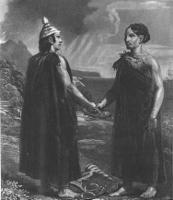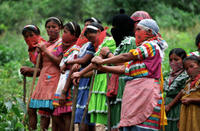The Coming Storm

In my opinion, there is a significant absence of dignity in "aboriginal" politics these days. Despite the pride with which many of our politicians and bureaucrats (I’m one of the latter by the way) carry themselves there is no longer any dignity in their actions. This omission while not openly discussed is evident everywhere. For the most part, our people are detached and uninvolved in the “politics” of our communities. Our leaders accuse the majority of apathy, and the vocal minorities of negativism. The desolate and seemingly hopeless lives of many of our community members, despite a few success stories, is further evidence of a lack of genuine, dignified leadership.
The Chief Commissioner of the BC Treaty Commission (former judge Stephen Point) recently said, “we have come a long way since 1969.” As much as I like Stephen personally, I must vehemently disagree. After this statement he went on to state a variety of criteria proving our Aboriginal ascendancy – education, training, careers and such. These are all indicators of success in the mainstream society. All they prove is how assimilated we have become. In almost every major indicator of Indigenous success; language, culture, way of life, things have gotten worse and unless we do something drastic now, we are well on our way to oblivion.
Why should community members be excited about surrendering (willingly this time) 95% of their lands? Why should we agree to final primacy of neo-colonial laws? Why should we agree to indemnify the imperialists for their lies and deceit and treachery for a few million dollars and tax bills? Many of us have watched our way of lives – fishing, hunting, trapping – disappear and be replaced with tourists, whale watching and oil rigs. How the hell are we supposed to get excited about that?
The last time the Indigenous people of this country collectively felt excitement, hope and dignity on a grand scale was in 1990. Many who were not raised strongly Indigenous, in fact many who lived as “undercover brothers” suddenly stuck their heads up, puffed their chests out because of the actions of their Mohawk brothers and sisters. People were moved. Many became born-again Indians. Since then other conflicts, perhaps to a lesser extent, have had similar effects, and our leadership have become increasingly co-opted.
We felt proud because someone was willing to fight, to take a stand. We felt proud because finally, someone (who looked like us) had had enough. Negotiation (especially from profound positions of weakness) does not inspire. Paying non-Indigenous lawyers copious amounts of money to argue facts we already know does not inspire. Mimicking mainstream society in our band politics does not inspire. Action inspires. Standing up and saying enough is enough inspires.
A storm is coming. Treaty commissioners, Indian Act Chiefs, negotiators, consultants, lawyers, and brown bureaucracies be damned, a storm of Indigenous dignity, hope and action is coming.




